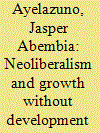|
|
|
Sort Order |
|
|
|
Items / Page
|
|
|
|
|
|
|
| Srl | Item |
| 1 |
ID:
176490


|
|
|
|
|
| Summary/Abstract |
With much fanfare, Ghana's Jubilee Oil Field was discovered in 2007 and began producing oil in 2010. In the six coastal districts nearest the offshore fields, expectations of oil-backed development have been raised. However, there is growing concern over what locals perceive to be negative impacts of oil and gas production. Based on field research conducted in 2010 and 2015 in the same communities in each district, this paper presents a longitudinal study of the impacts (real and perceived) of oil and gas production in Ghana. With few identifiable benefits beyond corporate social responsibility projects often disconnected from local development priorities, communities are growing angrier at their loss of livelihoods, increased social ills and dispossession from land and ocean. Assuming that others must be benefiting from the petroleum resources being extracted near their communities, there is growing frustration. High expectations, real and perceived grievances, and increasing social fragmentation threaten to lead to conflict and underdevelopment.
|
|
|
|
|
|
|
|
|
|
|
|
|
|
|
|
| 2 |
ID:
129095


|
|
|
|
|
| Publication |
2014.
|
| Summary/Abstract |
Ghana witnessed decent economic growth in the last three decades of implementing neoliberal policy prescriptions. Indeed, this growth promoted it to a low middle income country in 2010. Paradoxically, the wellbeing of most Ghanaians in the subaltern classes has not improved significantly, and they still suffer grinding poverty. How to understand this paradox of growth without development? This paper argues that the failure of Ghana to diversify its economy into industrialization, particularly manufacturing, explains the paradox. With its relatively good politics and open economy, the Ghanaian state should spearhead industrialization, as South Korea and Malaysia did, by supporting selective manufacturing firms with capital, technology, and protective tariffs.
|
|
|
|
|
|
|
|
|
|
|
|
|
|
|
|
|
|
|
|
|